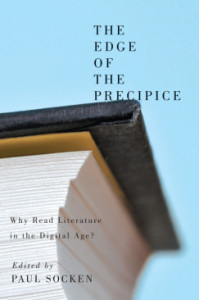
The Edge of the Precipice: Why Read Literature in the Digital Age?
By Paul Socken
My rating: 4 of 5 stars
What will become of reading? In particular, what will become of reading and engaging what have been considered the great works of literature from various cultures (no canon arguments here!)? With the advent of digital media with writing that comes to us in blog posts, tweets, and laced with visual content, what will happen to sitting down to read a long work like Don Quixote or War and Peace? With the growing emphasis on STEM education in our highly technological economy, will reading that seems to yield no immediate job skill or tangible benefit still have a place? These are among the questions explored in this collection of essays.
One of the things I realized immediately in reading this collection was that I was among my people! These people love reading and books and consider this love to have had a profound shaping influence in their lives. I suspect that people like that will love this book, particularly if they have been engaged in literary studies in the last several decades.
Some of the essays explore the questions of physical books versus various formats of e-books. The first is titled “Why I Read War and Peace on a Kindle (and bought the Book When I Was Done)”. A later essay, “Don’t Panic: Reading Literature in the Digital Age”, covers similar ground but is more hopeful about the value of e-books versus the aesthetics and advantages of physical books. These and other essayists in the book cover the now-familiar territory of discussions about how the media shapes our engagement with the content of books. Some are more reactionary, such as Sven Birkerts, in “Why the Novel and the Internet Are Opposites, and Why the Latter Both Undermines the Former and makes it More Necessary.” Yet, even as is implicit in the title of the first essay, I suspect most readers will engage in some hybrid of the two (or three if we include online, web content), which increasingly is my own view. The medium is a tool and every tool has particular uses and advantages. I wonder if in the coming years both publishers and users will become more discriminate to connecting medium to use.
Other essays focus on the value of great literature in our lives. Perhaps the most striking to me was Leonard Rosmarin’s narrative essay on “How Moliere and Co. Helped Me Get My Students Hooked on Literature”. This essay underscored for me what seems essential to grasp for those who care about great literature: we will never get people to read because they should but rather because they catch the love for great writing and make it their own. It was fascinating to me to learn how many of the essayists loved books from childhood and grew up in contexts where books were valued or were around inspiring teachers who imparted this love and ushered their students into the world of books. Other essays that explored the value of literature were that of
- Drew Nelles’ “Solitary Reading in an Age of Compulsory Sharing”
- Stephen Brockman’s “Literature as Virtual Reality”
- and the concluding essay, “Why Read against the Grain? Confessions of an Addict” by Gerhard van der Linde.
I believe it was in one of these essays (not easy to track down in the e-galley form I read this) that I also came across the great idea that one of the things that fosters reading is having books of one’s own, and not just those of parents or from the library.
One of the unique and delightful essays was Vincent Giroud’s “A World without Books” that introduces us to the work of the librarian-archivist dealing with multiple editions, translations, bindings, and preservation of these works. Digitization cannot capture all the subtleties that can be found by physically examining some of these books and often fails to provide crucial information about the provenance of digitized works.
So, if you love literature and reading, or are looking for a thoughtful exploration of reading and literature in the digital age, this is a good read.
[My review is based on an e-galley form of this book provided for review purposes from the publisher through Netgalley.]
Thank-you to Bob for sharing Review: The Edge of the Precipice: Why Read Literature in the Digital Age? from his blog Bob on Books — a challenging topic as we enter the fall term. As you may have guessed, the review led me to search for a little more background. I appreciated Interview with Paul Socken, Editor of “The Edge of the Precipice” by Hope Leman (Critical Margins: Perspectives on book culture, technology, and reading in the digital age, 10/16/2013). If you’re looking for related material, I direct you to Bob’s review of Why Read? by Mark Edmundson. If you have resources and/or thoughts to share, please do such 🙂 ~ Thomas B. Grosh IV, Associate Director, Emerging Scholars Network
Bob Trube is a former Associate Director of Faculty Ministry and Director of the Emerging Scholars Network. He blogs on books regularly at bobonbooks.com. He resides in Columbus, Ohio, with Marilyn and enjoys reading, gardening, choral singing, and plein air painting.

Leave a Reply